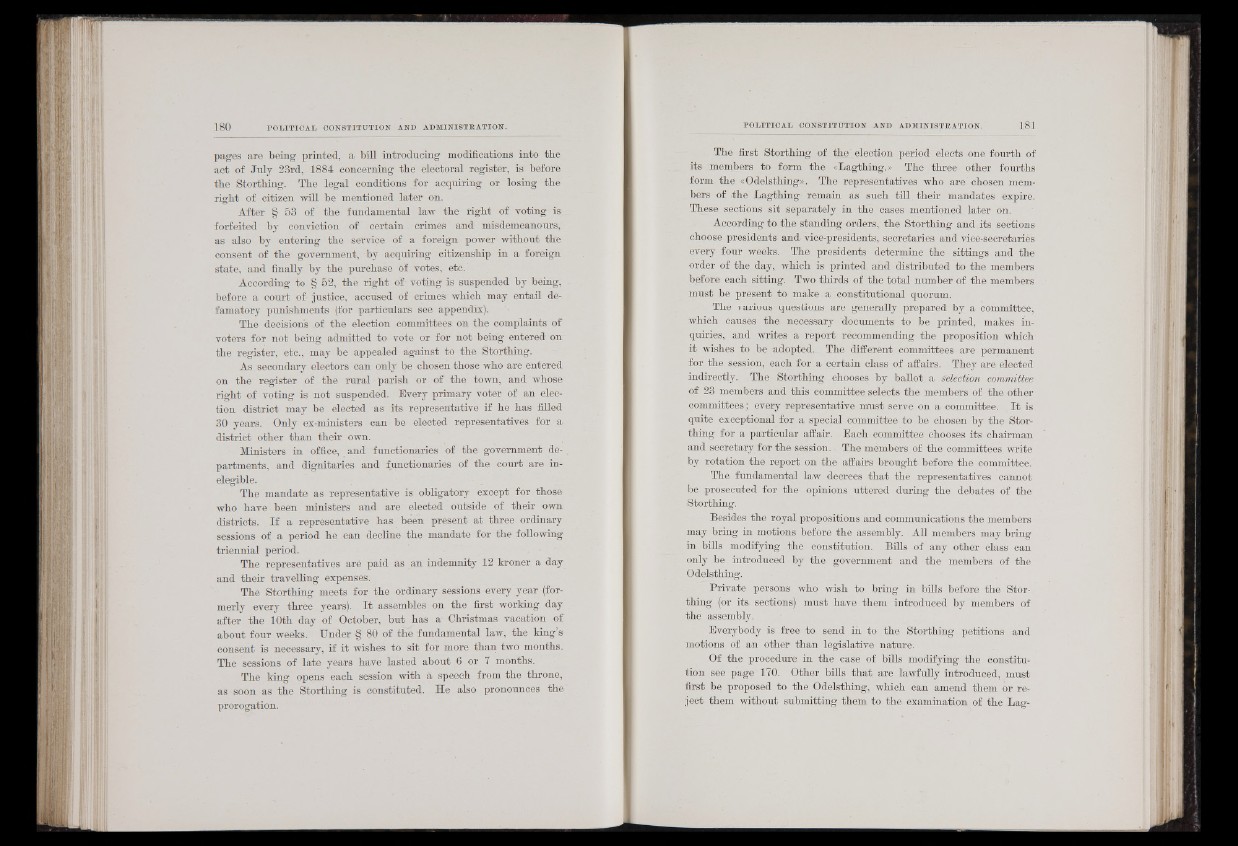
pages are being printed, a bill introducing modifications into the
act of July 23rd, 1884 concerning the electoral register, is before
the Storthing. The legal conditions for acquiring or losing the
right of citizen will be mentioned later on.
After § 53 of the fundamental law the right of voting is
forfeited by conviction of certain crimes and misdemeanours,
as also by entering the service of a foreign power without the
consent of the government, by acquiring citizenship in a foreign
state, and finally by the purchase of votes, etc.
According to § 52, the right of voting is suspended by being,
before a court of justiee, accused of crimes which may entail defamatory
punishments (for particulars see appendix).
The decisions of the election committees on the complaints of
voters for not being admitted to vote or for not being entered on
the register, etc., may be appealed against to the Storthing.
As secondary electors can only be chosen those who are entered
on the register of the rural parish or of the town, and whose
right of voting is not suspended. Every primary voter of an election
district may be elected as its represeiftative if he has filled
30 years. Only ex-ministers can be elected representatives for a
district other than their own.
Ministers in office, and functionaries of the government departments,
and dignitaries and functionaries of the court are inelegible.
The mandate as representative is obligatory except for those
who have been ministers and are elected outside of their own
districts. If a representative has been present at three ordinary
sessions of a period he can decline the mandate for the following
triennial period.
The representatives aré paid as an indemnity 12 kroner a day
and their travelling expenses.
The Storthing meets for the ordinary sessions every year (formerly
every three years). I t assembles on the first working day
after the 10th day of October, but has a Christmas vacation of
about four weeks. Under § 80 of the fundamental law, the king s
consent is necessary, if it wishes to sit for more than two months.
The sessions of late years have lasted about 6 or 7 months.
The king opens each session with a speech from the throne,
as soon as the Storthing is constituted. He also pronounces the
prorogation.
The first Storthing of the election period elects one fourth of
its members to form the «Lagthing.» The three other fourths
form the «Odelsthing». The representatives who are'chosen members
of .the Lagthing remain as such till their mandates expire.
These sections sit separately in the cases mentioned later on.
According to the standing orders, the Storthing and its sections
choose presidents and vice-presidents, secretaries and vice-secretariès
every four weeks. The presidents determine the sittings and the
order of the day, which is printed and distributed to the members
before each sitting. Two thirds of the total number of the members
must be present to make a ' constitutional quorum.
The various questions are generally prepared by a committee,
which causes the necessary documents to be printed, makes inquiries,
and writes a report recommending the proposition which
it wishes to be adopted. The different committees ■ are permanent
for the session, each for a certain class of affairs. They are elected
indirectly. The Storthing chooses by ballot a Selection committee
of 23 members and this committee selects the members of the other
committees ; every representative must serve on a committee. I t is
quite exceptional for a special committee to be chosen by the Storthing
for a particular affair. Each committee chooses its chairman
and secretary for the session. • The members of the committees, write
by rotation the report on the affairs brought before the committee.
The fundamental law decrees that the representatives cannot
be prosecuted for the opinions uttered during the debates of the
Storthing.
Besides the royal propositions and communications the members
may bring in motions before the assembly. All members may bring
in bills modifying the constitution. Bills of any other class can
only be introduced by the government and the members of the
Odelsthing.
Private persons who wish to bring in bills before the Storthing
(or its. sections)' must have them introduced by members of
the assembly.
Everybody is free to send in to the Storthing petitions and
motions of an other than legislative nature.
Of the procedure in the case of bills modifying the constitution
see page 170. Other bills that, are lawfully introduced, must
first be proposed to the Odelsthing, which can amend them or reject
them without submitting them to the examination of the Lag